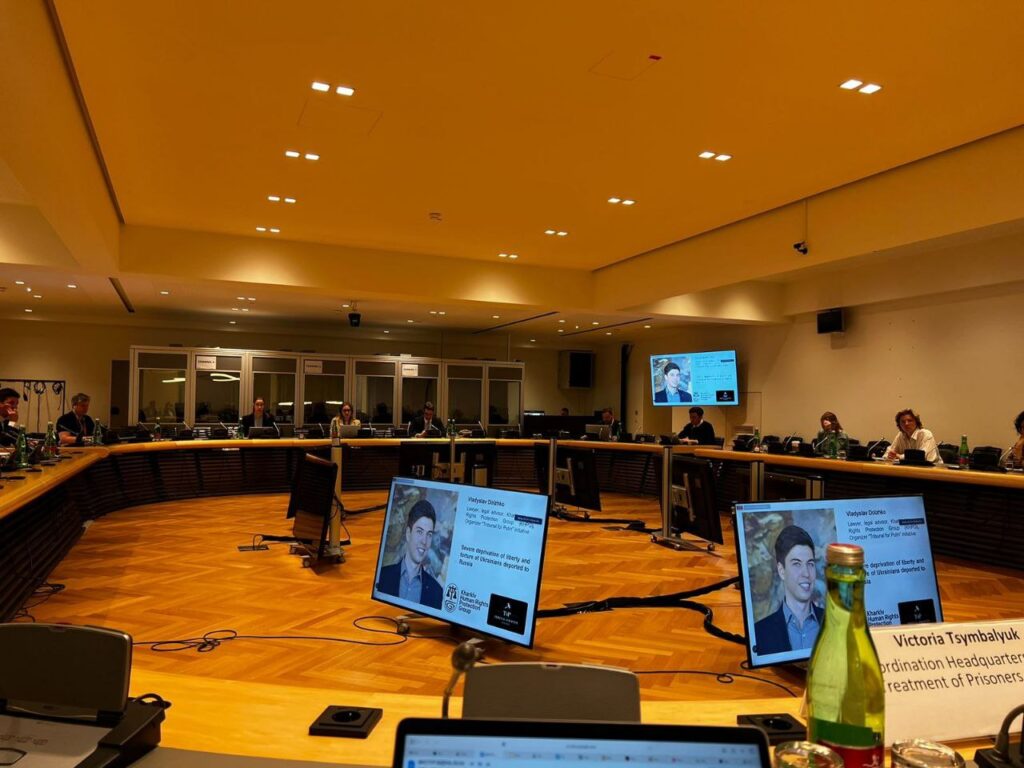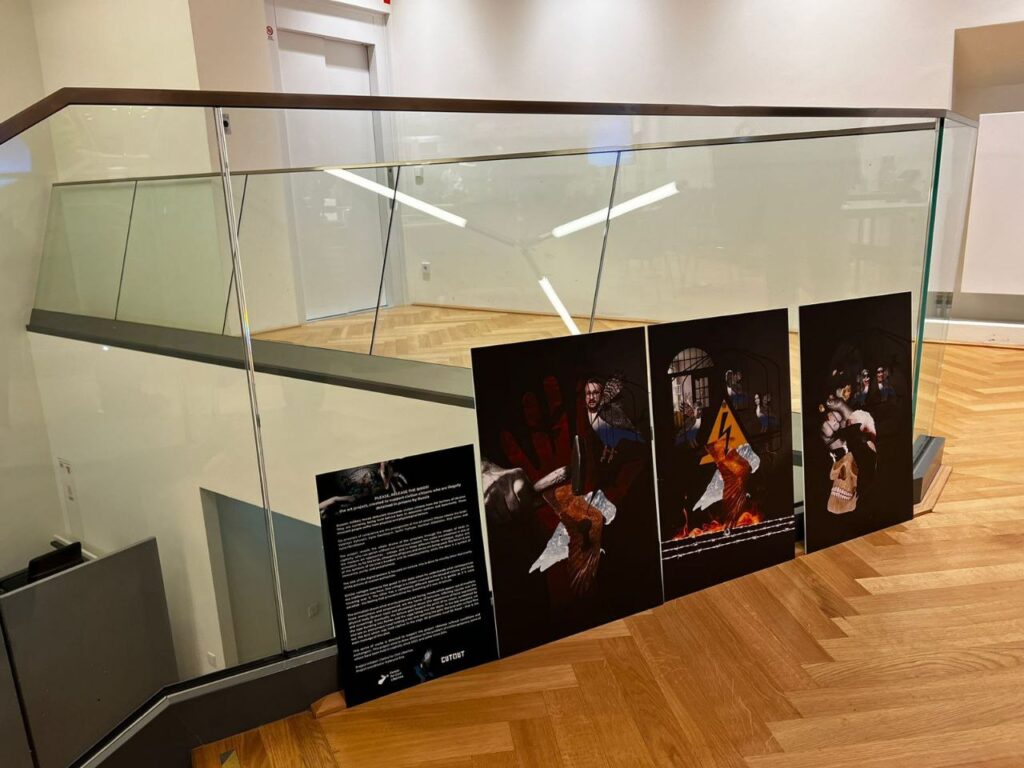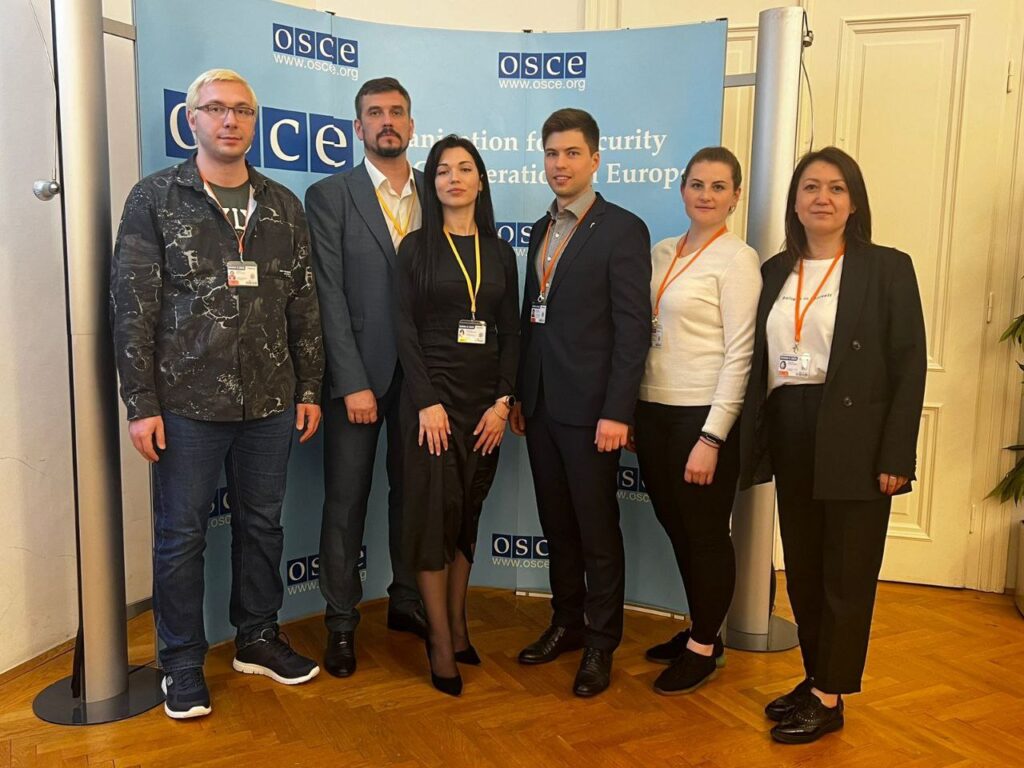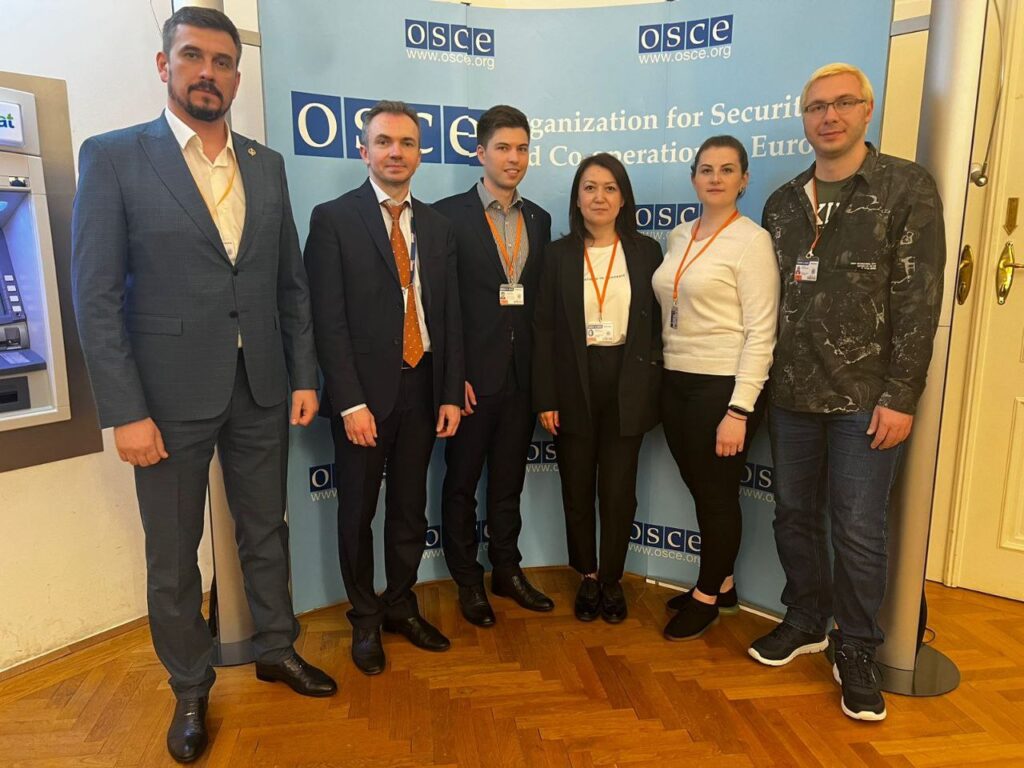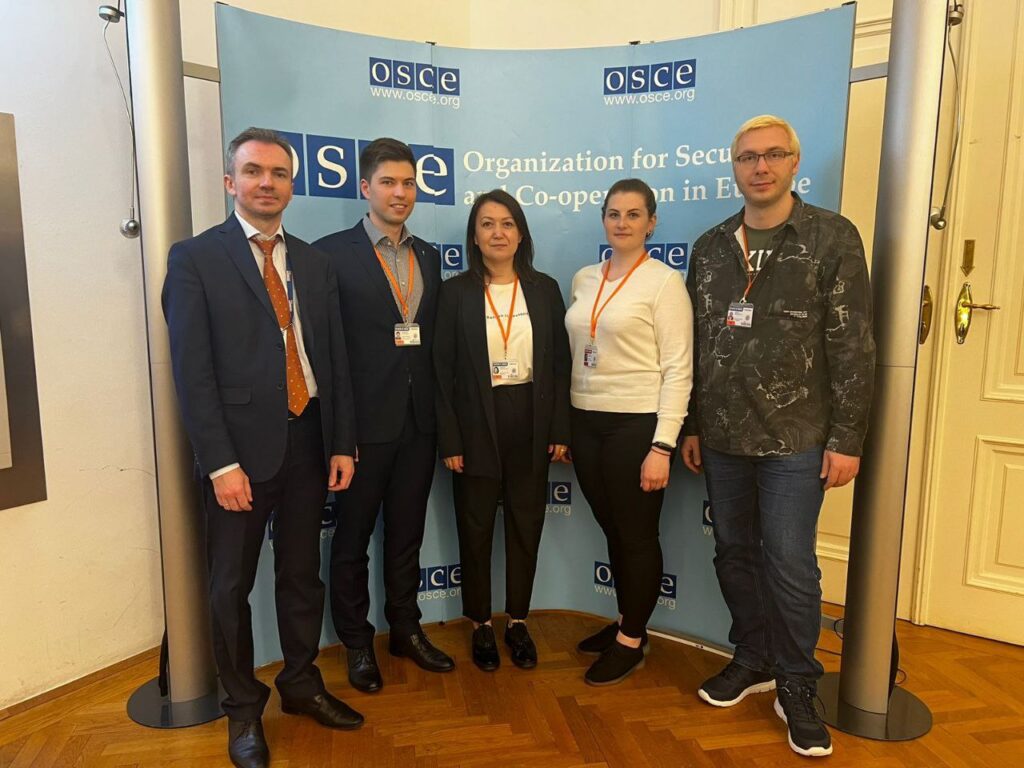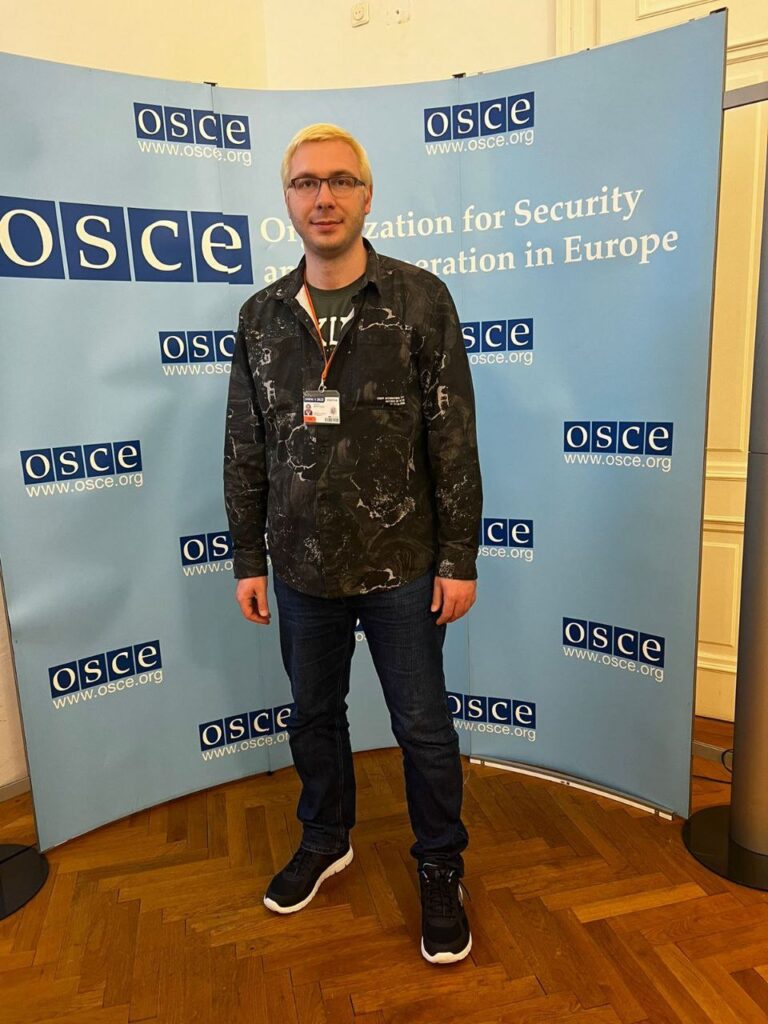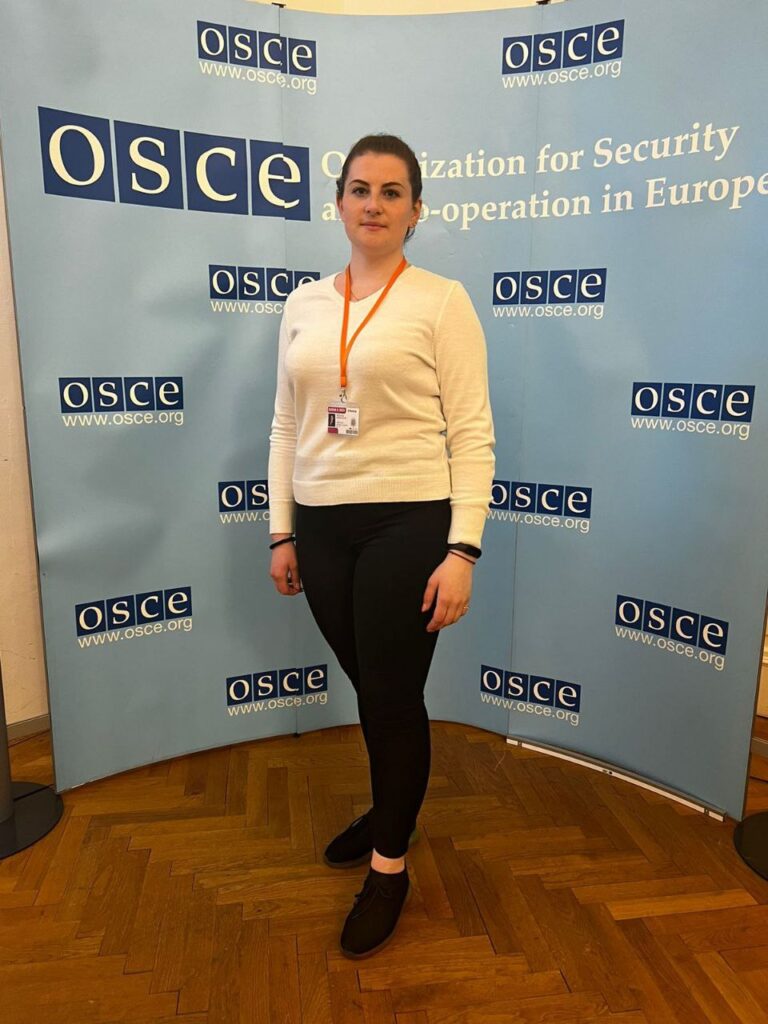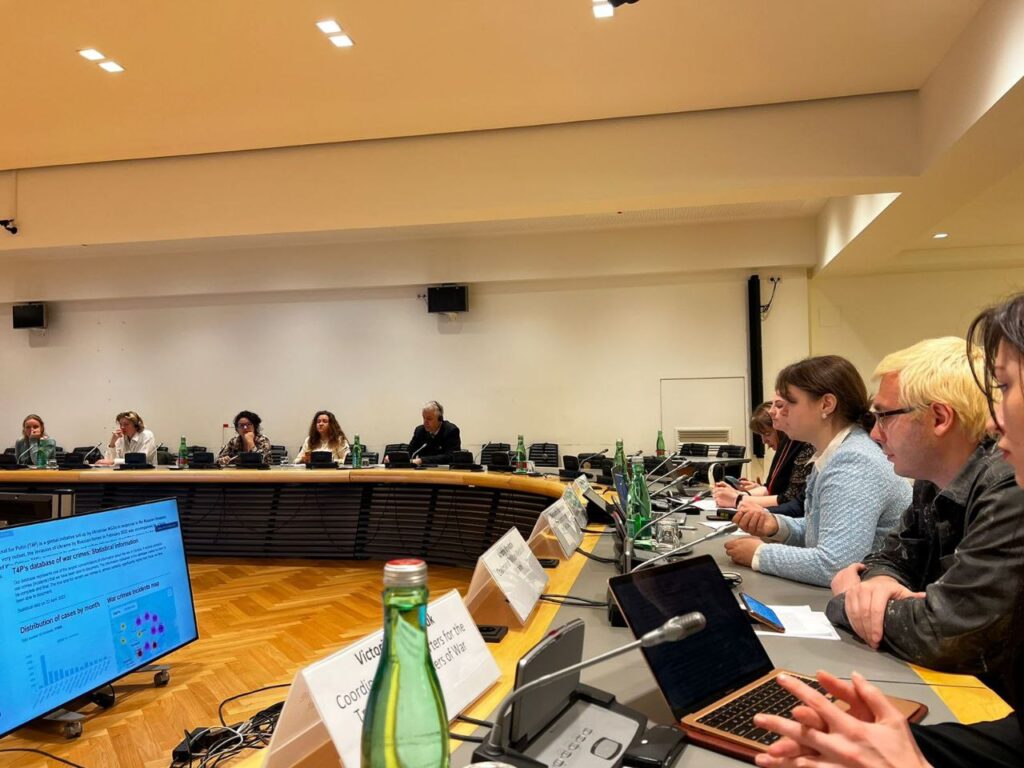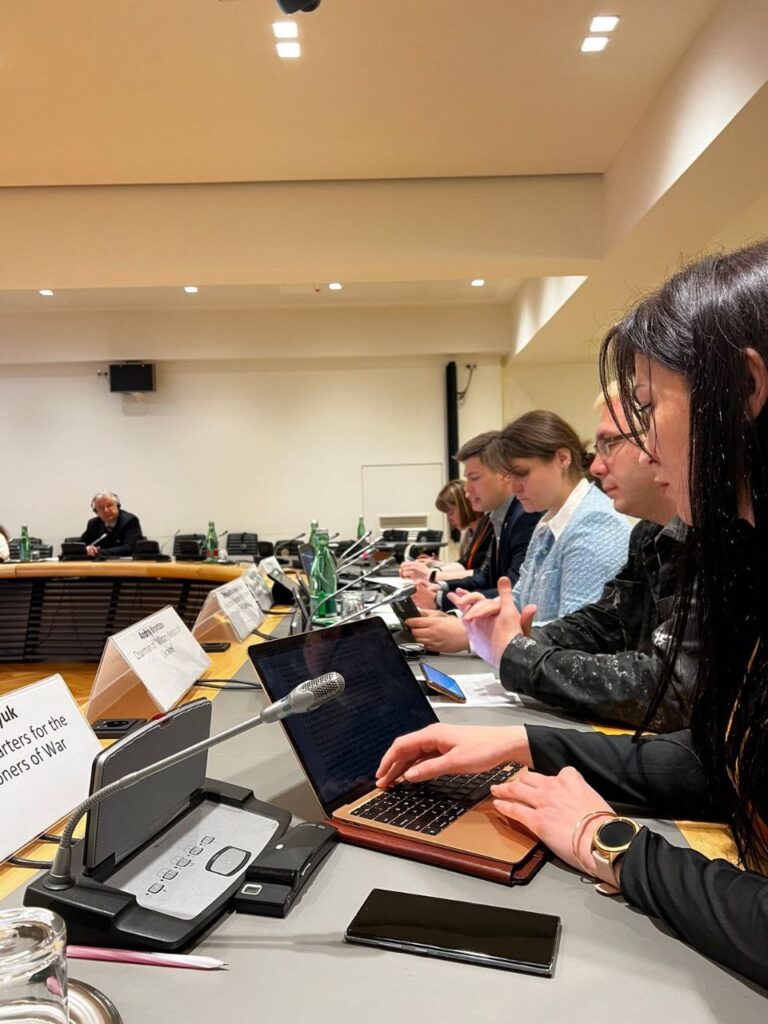Center for Civil Liberties Tribunal for Putin Initiative and Prisoner’s Voice roundtable. OSCE side meeting, Vienna, Austria—April 24th, 2023
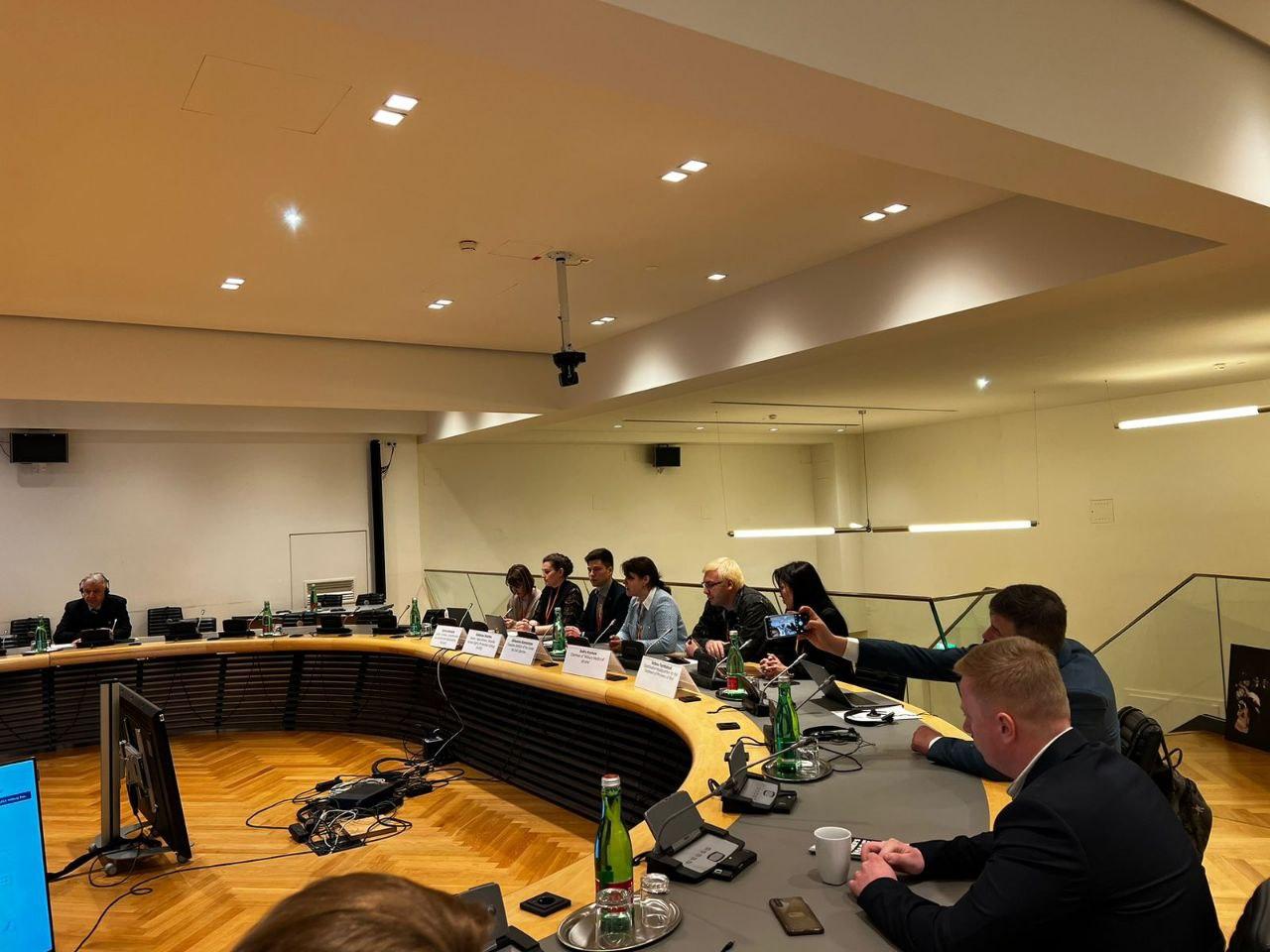
On Monday, April 24th, the Center for Civil Liberties (CCL) hosted a roundtable discussion of initiatives to document Russian war crimes and human rights abuses in Ukraine—the Tribunal for Putin Initiative (T4P). This discussion was a side event at the Organization for Security and Co-operation in Europe (OSCE) Alliance against Trafficking in Persons Conference, hosted in Vienna this week. The roundtable involved a variety of human rights reporting and monitoring organizations focused on Ukraine, with a testimony from a civilian POW and her experience being forcibly captured and deported by Russian soldiers. Our Executive Director, Oleksandra Romantsova, moderated the roundtable.
Concept Note
Since 2014, the practice of torture and ill-treatment of civilian prisoners, as well as prisoners of war, by Russian forces has spread to all occupied territories of Ukraine. The large-scale invasion of Russia on February 24, 2022 increased the number of victims of such violations of International Humanitarian Law hundreds of times, currently thousands of Ukrainians are suffering in prisons and illegal places of detention from the actions of the Russian army and paramilitary groups.
The target groups for abduction, arbitrary detention and deportation among civilians were, firstly, journalists, activists, representatives of local authorities, volunteers and ordinary civilians who tried to evacuate on their own or by force from places of active hostilities.
The #PrisonersVoice campaign has been keeping records of civilian victims of arbitrary imprisonment in the Russian Federation for more than 8 years, and has the testimony of both relatives of such prisoners and released civilians about the terrible conditions of their detention and treatment.
At the same time, human rights organizations that are part of the “Tribunal for Putin” initiative, as well as the state Coordination Headquarters for the Treatment of Prisoners of War, recorded numerous violations of the norms of Geneva Law on the part of the Russian side, regarding the standards of keeping prisoners of war, both combatants and non-combatants.
During the Sid event, a general overview of the situation of prisoners as a result of the Russian aggression of all the above-mentioned groups, as well as personal testimonies of civilian victims, was presented and proposed for discussion
Ordre du jour
Oleksandra Romantsova – moderator, Executive director of the Center for Civil Liberties, 8 years of experience in documenting war crimes on the territory of Ukraine
Speeches of the panelists:
Vladyslav Dolzhko – lawyer, legal advisor, Kharkiv Human Rights Protection Group (KHPG). Topic: Severe deprivation of liberty and torture of Ukrainians deported to Russia
Marharyta Tarasova, project coordinator, Ukrainian Helsinki Human Rights Union, deputy head of the USAID Human Rights in Action Program, an expert on places of deprivation of liberty. Topic: Torture documented by the T4P Initiative in the places of deprivation of liberty under Russian occupation.
Victoria Andrusha – civilian Ukrainian, a teacher who was detained and abducted by Russians.Witness testimony: Proof of arbitrary detention forced deportation and illegal detention of civilians, torture and ill-treatment conducted by the Russians.
Andriy Kryvtsov – Chairman of “Military Medics of Ukraine” Topic: Conditions of detention of military medics and seriously wounded prisoners of war by the Russian Federation.
Victoria Tsymbalyuk – Coordination Headquarters for the Treatment of Prisoners of War. Topic: Cruel treatment and torture of the POWs by the Russian Federation
The theme of the discussion focused on the OSCE meeting topic on human trafficking, specifically in the context of Ukraine. Oleksandra Romantsova opened with T4P graphics on war crimes and cases of missing, captured, or trafficking persons from Ukraine, with the overwhelming majority coming from conflict zones and temporary occupied territories in Eastern and Southern Ukraine. Vladyslav Dolzhko, lawyer with Kharkiv Human Rights Protection Group, agreed with Oleksandra’s statements and graphics, and noted that his organization also found similar evidence of abundant war crimes, torture, and capture and deportation of Ukrainian civilians and POWs. Their evidence suggests such crimes were committed by armed soldiers with no legal or procedural rights or consideration. Ukrainian civilians and POWs were widely tortured by Russian soldiers, mostly upon interrogation for information, by beatings, electric shocks, and body dismemberment. He found that families were tricked into being deported into the Russian federation, and many families were left wondering if their captured loved ones were even alive.
Marharyta Tarsova, with Ukrainian Helsinki Human Rights Union, continued and displayed similar evidence for torture and crimes against Ukrainians. She told of experiences of women in Kherson who were forcibly kept captive in a police detention center. At every level of the station, and even outside, Ukrainians were beaten, assaulted with weapons, shocked or tazed, held in detention cells for lengthy periods, suffered mock or blank executions, deprived food and medical aid, and suffered sexual violence as punishment. Russian soldiers forcibly transferred ~2000 existing prisoners and newly captured Ukrainians to Russia, to possibly (but unconfirmed) be conscripted into the Russian military. Marharyta then invited Victoriia Andrusha, a math teacher and captured victim for five months, to speak on her experience being forcibly trafficked to Kursk Oblast in Russia, just across the border. Victoriia told how her and other women were called “Banderites” and “nationalists”, and that Russian soldiers said they were already told everything they needed to know about the Ukrainians. Victoriia and other prisoners were also beaten, shocked and tazed, and even forced to sing Russian songs, say “Glory to Russia”, curse Zelenskyy, and ask for forgiveness from the Russian soldiers. Victoriia was eventually returned to Ukraine via the Belarus border in September 2022.
Several professionals spoke about the treatment of protected persons in war. Andrii Krystov is the Chairman of Military Medics of Ukraine and spoke on the conditions of detention of military medics and seriously wounded POWs by the Russian Federation. His organization has evidence that over 800 POWs have been captured and deported to Russia, who are protected under International Humanitarian Law. He said that over 82 women were captured at Illich Steel Plant in Mariupol when it was stormed in April 2022, some of which were military medics. Some captured medics were returned to Ukraine, where they were able to provide evidence of capture. While imprisoned, these women were kept in solitary confinement, suffered electrical torture, and were used as combat targets or practice. As of August 2022, at least 90 Ukrainian military medics are in Russian captivity, with at least another 67 missing. Victoriia Tsymbaliuk is with the Coordination Headquarters of Treatment of POWs, and works on humane POW exchange, outreach to families of POWs, and advocates to European and national legal systems for POW justice. Her evaluation and monitoring has shown that the Russian Federation has failed to adhere to POW treatment and exchange law. She notes that Russian soldiers commit evidenced war crimes and treat POWs with no regard to international law because they believe there will be no accountability for their actions, and that there is a shared inaction of maintaining international law and human rights practice. She references two viral incidents of Ukrainian soldiers—one being shot by Russian soldiers execution style after saying “Glory to Ukraine” as his final words, and another brutal, graphic video of a Russian soldier cutting a Ukrainian soldier’s head off with a knife. These two inhumane acts support her claim that Russian soldiers believe and act as if there actions will not have consequences.
About T4P role
The Tribunal for Putin (T4P) global initiative was set up in response to the all-out war launched by Russia against Ukraine in February 2022.
In all the regions of Ukraine, participant organizations document events that display features of crimes – defined in the Rome Statute of the International Criminal Court as genocide, crimes against humanity and war crimes.
During the documentation process, hundreds of volunteers joined the initiative and we engaged them as documentators throughout Ukraine.
The process consisted of initially interviewing the volunteers, informing them about the system, the purpose, the methods of documentation, and then deciding whether they had the necessary law and interviewing *(do no harm principle, trauma-informed interviewing) training and mental and physical capabilities to do this rather difficult job with the exposure to burndowns.
Then chosen volunteer had to undergo training on documenting war crimes and go with the trainer to interview the victims.
As for training:
We chose a system for documenting war crimes according to the Rome Statute, and we taught volunteers how to identify crimes according to it. This was very important because the system allowed us to qualify the type of crime, and determine the purpose and methods of collecting information.
We conduct our documenting work based on commonly established policies and practices provided by ICC, EUROJUST, PILPG and others.
CCL’s documenting process starts with OSINT research followed by investigative missions on the ground and verification, cheeks and due diligence.
So, we trained and established a team of professionals in charge of interviewing people, gathering information from witnesses, and collecting visual data. In cases when something happens, the team would directly go to that specific location. The documentation of a war crime is a very detailed process, it also includes searching for connections between cases, perpetrator tracking, and finding out the series of events that took place allows to re-establish the whole picture of the event and understanding of who the responsible individual for these atrocities is.
The process of documentation was carried out only with the personal consent of the victim. Documentation is held with video or a voice recording only with the personal consent of the victim. During the interviews, we try to find out the exact time and place of the crime and details, if possible.
We also took into account the amount of information the documenters receive, so we agreed on a recovery period to preserve their mental health. There is also a separate group of psychologists to whom the documenters can ask for help.
Today we have recorded more than 37606 war crimes. This is just the tip of the iceberg. While General Prosecutors Office are investigating 67,000 war crimes.
The “Tribunal for Putin” advocates for parties in a conflict to comply and respect the norms of international humanitarian law.
The initiative is actively working at the international level to use existing mechanisms in the UN, the Council of Europe, the OSCE (including Moscow Mechanism), the EU and the International Criminal Court to stop the brutality of these violations.
Also, our documentation work helps to highlight issues that need to be addressed immediately to prevent further mass human rights violations. Such as the forced relocation of hundreds of thousands of Ukrainian citizens to the territory of the Russian Federation.
Every participant from every organization and initiative has stories, evidence, and experiences of Russian war crimes, atrocities, and human rights abuses. All Ukrainian people and organizations support each other and share the pain inflicted by the Russian Federation, both in Moscow and in temporary occupied territory in Ukraine. The Center for Civil Liberties will continue to collaborate with such professionals and amount as much evidence as possible through our Tribunal for Putin Initiative to protect Ukrainians and bring occupiers and criminals to justice.

